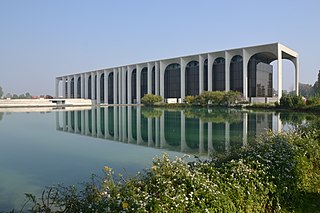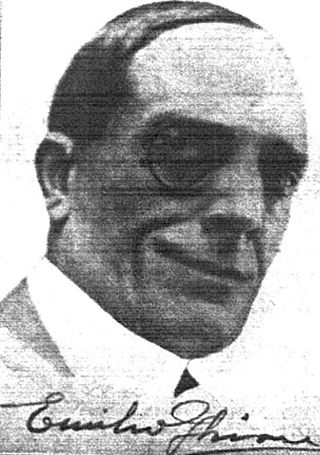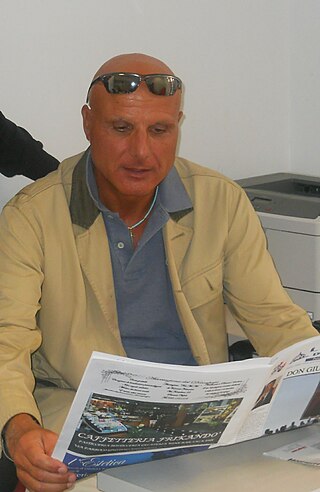
Arnoldo Mondadori Editore is the biggest publishing company in Italy.

Giovanni Agnelli was an Italian businessman. He cofounded Fiat S.p.A, an automotive industrial company, in 1899.

Vittorio Valletta was an Italian industrialist and president of Fiat S.p.A. from 1946 to 1966.

Sandro Veronesi is an Italian novelist, essayist, and journalist. After earning a degree in architecture at the University of Florence, he opted for a writing career in his mid to late twenties. Veronesi published his first book at the age of 25, a collection of poetry that has remained his only venture into verse writing. He has since published five novels, three books of essays, one theatrical piece, numerous introductions to novels and collections of essays, interviews, screenplays, and television programs.

Giuseppe Prezzolini was an Italian literary critic, journalist, editor and writer. He later became an American citizen.

Vittorio Umberto Antonio Maria Sgarbi is an Italian art critic, art historian, writer, politician, cultural commentator, and television personality. He is president of the Museum of Modern and Contemporary Art of Trento and Rovereto. Appointed curator of the Italian Pavilion at the 2011 Venice Biennale, Sgarbi is also a columnist for il Giornale and works as an art critic for Panorama and IO Donna. A popular ecletic and mediatic phenomenon, Sgarbi is well known for his glib, verbal aggressiveness, and insults, which often led to libels.

Giuseppe Aprile was an Italian castrato singer and music teacher. He was also known as 'Sciroletto' or 'Scirolino'.

Clorinda Corradi was an Italian opera singer and one of the most famous contraltos in history.

Giuseppe Cobolli Gigli was an Italian engineer and politician. From 1935 to 1939, he was member of Benito Mussolini's Italian fascist government as minister of public works.

Emilio Luigi Carlo Giuseppe Maria Ghione, known as Emilio Ghione, was an Italian silent film actor, director and screenwriter. Ghione was best known for writing, directing, and starring in the Za La Mort series of adventure films, in which Ghione played a likeable French Apache and 'honest outlaw'. Ghione directed, wrote, and acted in every genre of film, and directed some of the most famous stars of the time, including Francesca Bertini, Lina Cavalieri, Alberto Collo, and Hesperia. After his final film role in 1926, Ghione briefly performed on a theatrical tour of Italy. Ghione wrote three novels based around his Za La Mort character, an autobiography, and an essay on Italian Silent Cinema, before his death from tuberculosis in 1930.
Roberto de Mattei is an Italian traditionalist Catholic historian and author. His studies mainly concern European history between the 16th and 20th centuries, with a focus on the history of religious and political ideas. He is known for his anti-evolutionist positions, also publicised in institutional circles, for his critique of relativism and the lines of thought established in the Catholic Church after the Second Vatican Council.

Pier Antonio Quarantotti Gambini was an Italian writer and journalist, author of novels, poetry, and essays.
Luigi Firpo was an Italian historian and politician, who was born and died in Turin.

Ermenegildo De Stefano is an Italian journalist, music critic and musicologist. He specializes in African-American music. He is a music journalist, sociologist, and critic for the Italian daily Roma and art director of the Italian Festival of Ragtime.

DonnaVirginia Bourbon del Monte dei principi di San Faustino was the wife of Edoardo Agnelli and the mother of Gianni Agnelli.
Andrea Della Corte was an Italian musicologist and critic. Born in Naples on 5 April 1883, Della Corte studied law at the University of the native city, but was self-taught in music. After some short experiences in Neapolitan papers, he moved to Turin, where he was music critic for La Stampa from 1919 to May 1967. He brought the music journalism in Italy to a level of «professionalism hitherto unknown». In Turin, Della Corte also taught history of music, both at the Turin Conservatory (1926–53) and at the University of Turin (1939–53).
Alberto Basso is an Italian musicologist and librarian.

Giorgio Ficara is an Italian essayist and literary critic. He is Full Professor of Italian Literature at the University of Turin.

Chiara Valerio is an Italian author and essayist.
Luca Poma is an Italian journalist, university professor, writer, and political adviser, having served as an adviser to the Italian Minister of Foreign Affairs Giulio Terzi di Sant'Agata.















